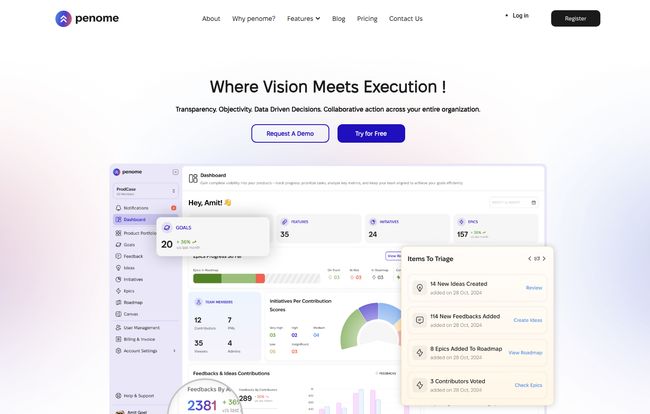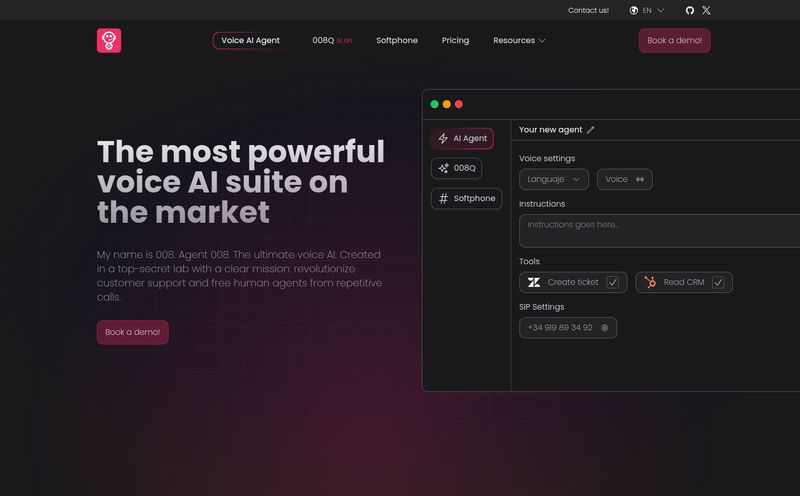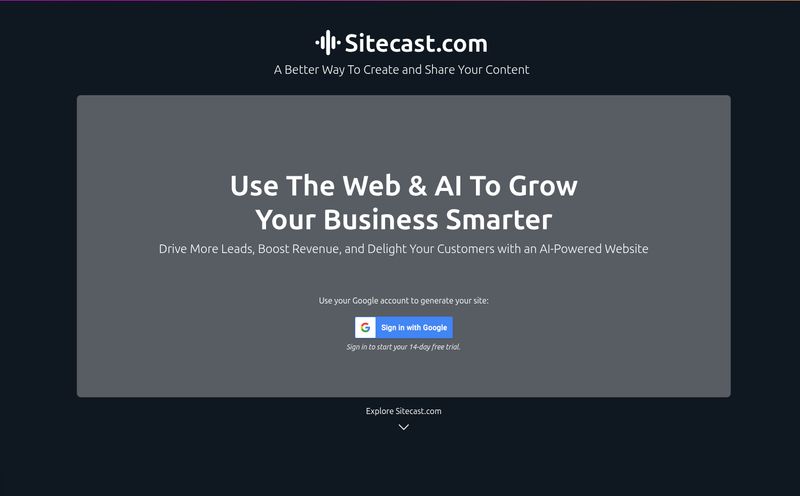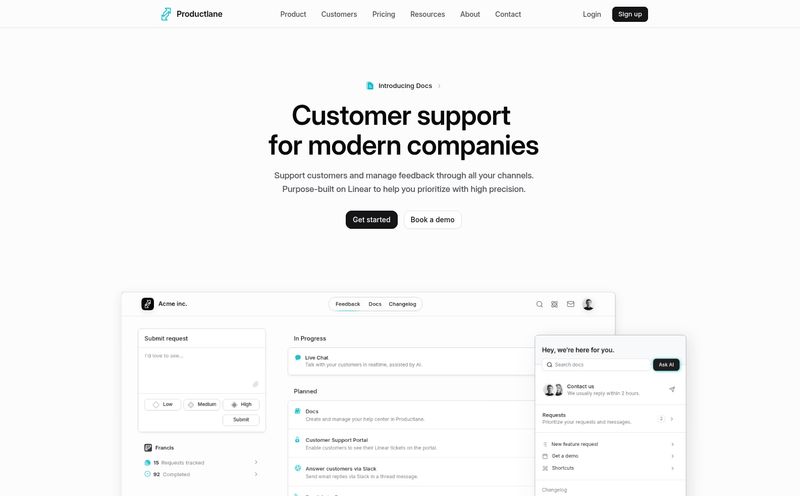If you're a product manager, your brain probably looks a lot like my browser tabs on a Tuesday morning—chaotic, overloaded, and with at least one tab playing music you can't find. You’re juggling stakeholder demands, a tsunami of user feedback from ten different channels, and the constant pressure to ship features that actually move the needle. We've all been there, defending our roadmap with little more than gut feelings and a well-designed slide deck.
For years, we’ve cobbled together solutions. Jira for the engineers, a maze of spreadsheets for prioritization, Slack for feedback (god help us), and a Powerpoint for the roadmap that's out of date the second you save it. So when another “all-in-one” product management platform shows up, my default reaction is a healthy dose of skepticism. But every now and then, something comes along that makes you lean in a little closer. For me, recently, that’s been Penome.
They talk a big game—phrases like “Where Vision Meets Execution” and “data-driven prioritization.” But what does that actually mean for those of us in the trenches? I decided to dig in and see if it’s just shiny marketing or if there’s some real substance under the hood.
So, What is Penome, Really?
At its core, Penome is a product management platform built on a simple, yet powerful, premise: every decision you make should be tied back to a measurable goal. It’s designed to pull you out of the “feature factory” mindset, where success is measured by how much you ship, and push you toward a value-driven approach, where success is measured by the impact you create.
Think of it less like a to-do list and more like a strategic command center. It forces you to ask the hard questions upfront. Instead of just adding a feature request to a backlog, Penome encourages you to define why. Which company goal does this support? Which metric (or “Lever,” in their terminology) will this move? It’s about building a clear, logical line from a tiny user suggestion all the way up to a C-level objective. I've always felt this was the missing link in most tools, which are great at tracking the what but terrible at explaining the why.
The Features That Genuinely Caught My Eye
A feature list is just a list. What matters is how they work together to solve a real problem. And Penome has a few tricks up its sleeve that feel pretty darn smart.
Penome Copilot: Your AI Sidekick (That Actually Helps)
Okay, I know. Slapping “AI” on everything is the big trend right now. Most of the time, it’s just a glorified search bar. But Penome Copilot feels a bit different. It’s woven into the platform to handle the grunt work that drains a PM's soul. It can analyze and summarize mountains of user feedback, automatically tag and categorize ideas, and even suggest which initiatives will have the biggest impact on your goals based on the data you've fed it. It's not here to do your job for you, but it’s like having a hyper-efficient junior PM who organizes everything so you can focus on the big picture. And for that, I’m grateful.
From Feedback Chaos to Strategic Clarity
I once tried to manage user feedback in a single, monstrous Trello board. It was a disaster. Penome’s approach to Feedback and Idea Management is a breath of fresh air. It centralizes everything, whether it comes from Intercom, email, or a sales call. But the magic is in the connection. An idea doesn't just sit in a backlog; it gets linked to specific pieces of feedback, scored for potential impact, and then mapped directly to a strategic Goal. You’re not just collecting ideas; you’re building a case file for them.

Visit Penome
The Holy Grail: Connecting Roadmaps to Reality
This is where it all comes together. The Roadmapping & Prioritization features are directly tied to the Goals & Contributions you set up. You can literally see, in black and white, how your product roadmap is expected to impact the company’s bottom line. It changes the conversation with stakeholders from “I think we should build this” to “The data suggests building this will drive our ‘User Retention’ lever by an estimated 5%.” It’s a game-changer for getting buy-in and defending your decisions.
This system of tying initiatives to goals and levers creates a clarity that’s honestly hard to achieve with a spreadsheet and some VLOOKUPs. It’s the kind of thing that helps you sleep a little better at night, knowing your roadmap isn't just a collection of good ideas, but a strategic plan.
Alright, Let's Talk About the Price Tag
No review is complete without talking money. It's often the deciding factor, right? Penome’s pricing is refreshingly straightforward, which I appreciate. No need to book a 45-minute demo just to see a number.
| Plan | Cost | Best For |
|---|---|---|
| Free | $0 | Single-person teams or those wanting to test it out for free, for life. Seriously. |
| Professional | $24/Product Manager/mo $19/Contributor/mo Viewers are free | Most teams up to 200 people. This feels like the sweet spot for startups and scale-ups. |
| Enterprise | Custom Pricing | Large organizations needing the whole shebang: SAML, dedicated hosting, premium support, etc. |
My take? The free plan for a single PM is incredibly generous and a fantastic way to get your feet wet. The Professional plan’s pricing is right in line with the market, especially considering the AI features included. For a growing startup, the cost seems more than reasonable for the amount of strategic clarity and alignment it can bring. It's an investment in not wasting engineering hours on the wrong things.
Is It All Sunshine and Data Points?
Look, no tool is perfect. While I’m pretty enthusiastic about Penome, there are a few things to keep in mind. Some people might find the data-centric approach a bit rigid. Product management has always been a mix of art and science, and there’s a risk of becoming so reliant on the numbers that you ignore the qualitative, gut-feel insights that come from truly knowing your users. My advice is to use Penome to inform your intuition, not replace it.
There's also a bit of a learning curve. Because it’s not just a simple backlog tool, you and your team will need to invest time in setting up your goals and levers properly. If you do that work upfront, it pays off massively. If you don't, you'll just have a very expensive, complicated to-do list. Finally, while the pricing is fair, for a very large organization with hundreds of contributors, that per-seat cost can start to add up. But at that scale, you're probably looking at the Enterprise tier anyway.
So, Who is Penome Actually For?
In my opinion, Penome is a fantastic fit for a few specific groups:
- Data-Informed Product Managers: If you're tired of making decisions based on who yells the loudest, this is your tool.
- Startups and Scale-ups: It provides a framework to build a strong, objective product culture from the ground up, preventing a lot of the chaos that comes with growth.
- Teams struggling with alignment: If your engineering, marketing, and leadership teams all seem to have different priorities, Penome can be the single source of truth that gets everyone rowing in the same direction.
It might not be the best fit if you're a very small team that just needs a simple kanban board to track tasks, or if your company culture is allergic to data and runs purely on instinct.
My Final Verdict
I've seen a lot of tools that promise to revolutionize product management. Most of them are just prettier versions of the same old thing. Penome feels different. It has a strong, opinionated philosophy and gives you the features to actually implement it. It’s not just about managing a backlog; its about building a better product by making smarter, evidence-backed decisions.
It won't magically solve all your problems, but it provides a powerful framework for connecting your daily work to your highest-level goals. And in a world of endless feature requests and limited resources, that kind of clarity is worth its weight in gold. If you're feeling the pain of roadmap chaos, I'd say giving their free plan a spin is a no-brainer.
Frequently Asked Questions
- Can I really use Penome for free?
- Yes! According to their site, a single-person team can use Penome for free, for life. This is great for solo founders, individual PMs, or just for giving the platform a thorough test drive.
- What’s the difference between a Product Manager and a Contributor role?
- Typically in these platforms, a Product Manager has full administrative rights to set goals, define roadmaps, and manage priorities. A Contributor (like a designer, marketer, or developer) can add ideas, comment, and participate but has more limited permissions, which is reflected in their lower price point.
- How does Penome handle data security and privacy?
- While you'd need to check their specific policy, modern SaaS platforms like this usually take security very seriously, with data encryption in transit and at rest, and compliance with standards like GDPR. The Enterprise plan even offers dedicated hosting for extra security.
- Is Penome only for software and tech companies?
- While its design certainly lends itself to software development, the core principles of goal-setting, idea management, and data-driven prioritization could be applied to almost any team that builds or manages products, whether they're physical goods or internal services.
- Does Penome integrate with other tools like Jira or Slack?
- Integration is key for workflow. The Professional plan mentions integration support, and the Enterprise plan specifically calls out Twitter integration. It's a safe bet that common integrations like Jira, Slack, and Zapier are either available or on their roadmap, as they're table stakes for a PM tool today.



